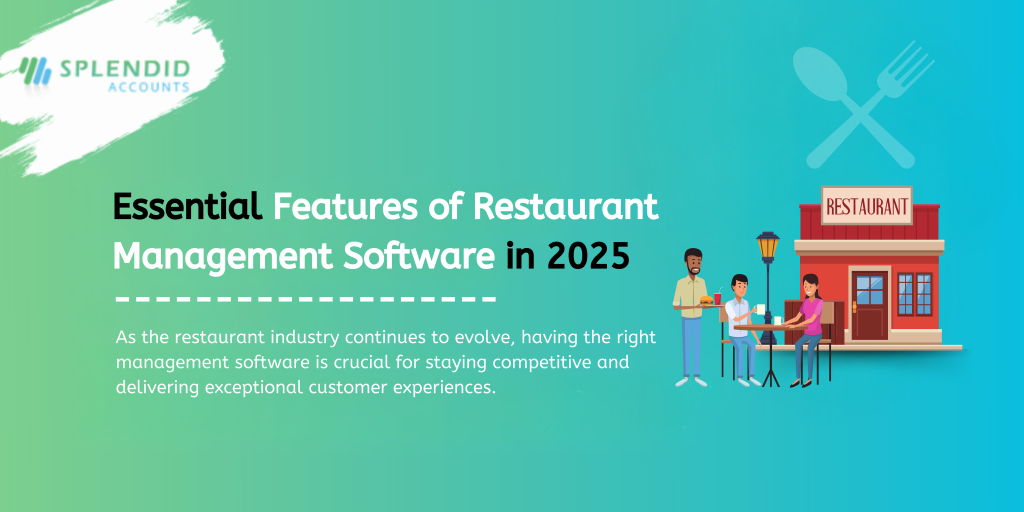
As the restaurant industry continues to evolve, having the right management software is crucial for staying competitive and delivering exceptional customer experiences. In 2025, restaurant management software must include advanced features that streamline operations, enhance efficiency, and adapt to technological advancements. Below are the must-have features for modern restaurant management software.
1. Cloud-Based Operations
Why It’s Essential: Cloud-based solutions provide unparalleled accessibility and scalability, allowing restaurant owners and managers to oversee operations from anywhere.
Key Benefits:
- Real-time updates on sales, inventory, and employee performance.
- Reduced infrastructure costs and easy integration with other tools.
- Seamless software updates without disruptions to operations.
2. AI-Powered Insights
Why It’s Essential: Artificial Intelligence can analyze sales trends, predict demand, and offer actionable insights to improve decision-making.
Key Benefits:
- Optimizes menu offerings by identifying best-selling items.
- Reduces food waste by forecasting inventory requirements.
- Enhances customer experiences through personalized recommendations.
3. Integrated Order Management
Why It’s Essential: Efficiently managing dine-in, takeout, and delivery orders in one system is critical for maintaining accuracy and speed.
Key Benefits:
- Minimizes errors by centralizing all orders.
- Improves order tracking and customer satisfaction.
- Reduces time spent juggling multiple platforms.
4. Advanced POS Systems
Why It’s Essential: Point of Sale (POS) systems must now go beyond billing, integrating seamlessly with inventory, customer relationship management (CRM), and accounting tools.
Key Benefits:
- Streamlines overall operations.
- Provides accurate and comprehensive financial reports.
- Supports multiple payment methods for convenience.
5. Mobile and Table Management
Why It’s Essential: Mobile accessibility and efficient table management enhance customer experiences and optimize restaurant layouts.
Key Benefits:
- Online table reservations reduce wait times.
- Mobile apps enable staff to manage seating efficiently.
- Maximizes seating capacity for higher revenue.
6. Contactless Payment Options
Why It’s Essential: With growing demand for secure and hygienic transactions, contactless payment methods are non-negotiable.
Key Benefits:
- Speeds up the checkout process.
- Enhances customer satisfaction with diverse payment options such as NFC, QR codes, and mobile wallets.
- Reduces reliance on cash handling.
7. Inventory and Recipe Management
Why It’s Essential: Effective inventory management reduces waste, controls costs, and ensures consistent food quality.
Key Benefits:
- Tracks stock levels in real time.
- Links inventory to menu items for accurate recipe costing.
- Alerts staff when inventory reaches reorder levels.
8. Employee Scheduling and Management
Why It’s Essential: Managing staff shifts, payroll, and performance metrics is essential for operational efficiency.
Key Benefits:
- Reduces scheduling conflicts.
- Tracks employee performance and attendance.
- Improves staff productivity and morale.
9. Marketing and Loyalty Program Integration
Why It’s Essential: A robust loyalty program helps retain customers and drive repeat business.
Key Benefits:
- Personalizes offers based on customer preferences.
- Increases customer engagement through rewards programs.
- Simplifies marketing campaigns with built-in tools.
10. Robust Reporting and Analytics
Why It’s Essential: Data-driven insights are vital for identifying areas of improvement and tracking overall performance.
Key Benefits:
- Generates detailed reports on sales, customer behavior, and operational efficiency.
- Helps in making informed decisions to boost profitability.
- Monitors key performance indicators (KPIs) in real time.
11. Multi-Channel Order Integrations
Why It’s Essential: Consolidating orders from delivery apps, online platforms, and social media ensures seamless order management.
Key Benefits:
- Expands customer reach.
- Simplifies workflows by centralizing order channels.
- Enhances customer satisfaction with faster service.
12. Compliance and Security
Why It’s Essential: Ensuring compliance with tax regulations, food safety standards, and data protection laws is non-negotiable in 2025.
Key Benefits:
- Reduces legal risks and penalties.
- Builds customer trust through secure transactions and data privacy.
- Simplifies tax filing and regulatory reporting.
Conclusion
Restaurant management software in 2025 must go beyond basic functionality to provide a comprehensive solution that supports operational efficiency, enhances customer satisfaction, and fosters business growth. By incorporating these essential features, restaurant owners can stay ahead in an increasingly competitive and technology-driven industry.
